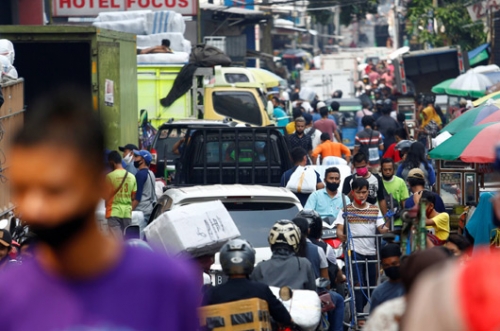Indonesia's economy contracts for first time in 20 years
Agencies | Jakarta
The Daily Tribune – www.newsofbahrain.com
Indonesia's economy contracted for the first time in 20 years in the second quarter, putting the archipelago at serious risk of a COVID-induced recession.
The country's real gross domestic product plunged 5.32 percent in the three months ended in June from a year earlier, according to data released on Wednesday by the country's statistics agency. The slowdown follows 2.97pc growth in the previous quarter.
The rate of decline was greater than the 4.61 pc contraction forecast in a Reuters poll of 20 analysts, and faster than the 4.3pc slide forecast by President Joko Widodo.
This was the first fall in GDP since the first quarter of 1999 when the country was reeling from the Asian Financial Crisis, according to data from the Organization for Economic Cooperation and Development.
The large-scale social restrictions put in place across Indonesia to curb the spread of the virus affected most components of economic activity. Household consumption, which makes up over half of Indonesia's GDP, shrunk 5.32 pc year on year -- the first contraction since the final quarter of 1998.
While the government has set aside a stimulus package and the central bank has cut rates several times, the economy is expected to continue to struggle as the rising number of coronavirus patients forces municipalities to maintain social restrictions. The city of Jakarta extended a "transition period" for easing restrictions for a third time last week, meaning offices, shopping malls and other public places can only run at half capacity.
Indonesia's total coronavirus cases on Tuesday reached 115,056, nearly double the number at the start of July.
The government has also been slow to use its stimulus budget, with only 20pc of 695 trillion rupiah ($47.8 billion) being put to use as of Monday.
Bank Indonesia, the central bank, is predicting a "U-shaped recovery," meaning the economy is likely to languish for some time. A recession, defined as two consecutive quarters of negative growth, would be the country's first since the Asian Financial Crisis in 1998. In its worst-case scenario, the government expects a full-year contraction of 0.4pc.
Economists, however, believe the government's outlook is too optimistic.
"We remain cautious on the likely pace of recovery in the second half of the year, with GDP growth contracting 2.7pc in 2020 as a whole," said Sung Eun Jung, economist at Oxford Economics. "We forecast a slow recovery path with annual growth still contracting in the second half of the year before returning to positive territory in 2021."
Gareth Leather, senior Asia economist at Capital Economics echoed this view, saying that the firm expects GDP to "contract by around 3pc this year.
"We expect a weak recovery. Indonesia is still reporting roughly 2,000 new cases of coronavirus a day, with little sign the virus is being brought under control," Leather said. "Fear of catching the virus means people will be reluctant to fully resume their normal lives. Social distancing will need to last for longer."
The World Bank had said in a July report that "risks to the outlook are still heavily tilted to the downside."
"Since early June, Jakarta and several other regions in Indonesia have begun to transition towards a new normal by gradually easing mobility restrictions," the multilateral institution said, adding that this could lead to a resurgence of infections.
It could also potentially compel "the government to introduce another bout of mobility restrictions," the report says. "Such containment measures will again curtail demand and supply and weigh on domestic economic activity."
Related Posts

